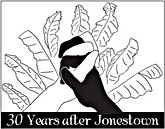 Thirty years as a survivor of Jonestown have passed. The trauma of that event is unlike what few have ever had to encounter and fortunately few ever will. As much as I have learned from that experience, I often find it futile to talk about it because it is nearly impossible for people to look past the stigma of what is believed to be the reality of Jonestown.
Thirty years as a survivor of Jonestown have passed. The trauma of that event is unlike what few have ever had to encounter and fortunately few ever will. As much as I have learned from that experience, I often find it futile to talk about it because it is nearly impossible for people to look past the stigma of what is believed to be the reality of Jonestown.
One of the first lessons I learned soon after November 18th, 1978 was how little I really understood about what was happening within People Temple. Members had to be careful what they said fear of being reported by friends or family, so it was no surprise that afterwards when survivors had a chance to talk freely, we learned a great deal from each other about how messed up so much was. Even then, the complexity of the situation made true comprehension impossible for the general public, especially since this was a sensational story and the public demanded to know what had happened. Those of us who survived only know a part of what happened.
Enter the media.
The first time the media came into my life, I realized that this group which I had admired for the most part, was comprised of some of the most egotistical and biased individuals I had ever encountered. They were ruthless in their pursuit of a story for which they had already written the conclusion. All they were looking for was information to support their assumptions. To be fair, since I didn’t understand what happened on November 18, how could I expect an outsider to? But I was disappointed that most reporters didn’t even try. It took me about five years before I stopped speaking with the media, and I have no regrets.
The transition back to society was brutal for most survivors. As a 20-year-old who had just lost seven family members and nearly all of my friends, I had a hard time relating to my peers. In addition, everyone else I knew was suffering just as much as I was. On top of all of that, most people had no compassion for the suffering that the survivors endured. Sharing my story often brought ridicule based on opinions that were based on fiction instead of fact. I spent my energy defending the people of Peoples Temple. I knew I needed help, but the first time I went to seek professional help, the analyst was more interested in collecting data about Jim Jones than trying to help me heal from the trauma. Despite all of this, I was able to move on.
I knew I’d been spared, but the experience left me with a sense of great responsibility. I felt I had to make something of my life, and I put myself under a lot of pressure to make the most of my second chance, but I failed to find my calling. There was one incident in particular that helped me to move forward with my life.
One afternoon I was at a hospital. I was really depressed that day and I was really tired of feeling depressed all of the time. Self pity was starting to creep into my mind. I had walked over to the elevator to go upstairs when the elevator door opened and a young woman suffering from leprosy was sitting there in a wheelchair. I immediately realized I had no reason not to make something of myself. I was scarred, but on the inside. This poor woman was scarred too, and my bias toward leprosy was immediately engaged. I wasn’t judged until I spoke about what had scarred me, while she was scarred – and judged – based on her appearance alone. My decision to truly heal began then.
I eventually found a good therapist and learned to trust again and to risk the pain of living life. I know that in order to open up my heart, I also expose it, and that was one of the most frightening things I have ever had to do. There are still some lingering effects of course. For example, to this day, I am uncomfortable in a church, and am very suspicious of what motives a pastor has when preaching to a congregation.
After all of these years, I’m still much more of a bitter person than I would like to be. I rarely talk about Peoples Temple anymore, but when I have had opportunities to share my stories, I had typically done so to help people through a personal crisis. My experiences have provided valuable counseling to help them overcome their difficulties In the end, helping others with lessons that I have learned by surviving Jonestown is the best result this survivor could hope for.
(Mike Carter is a regular contributor to the jonestown report. His complete collection of stories for this site may be found here.)